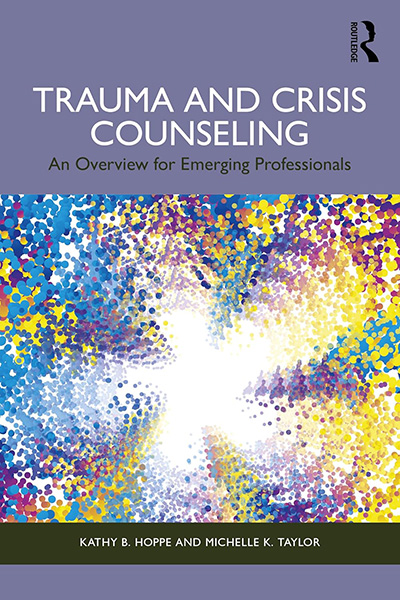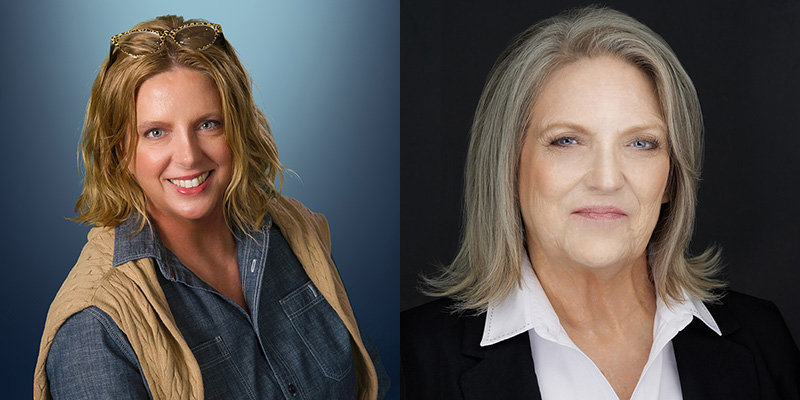When Dr. Michelle Taylor and her colleague Dr. Kathy Hoppe were looking for material to use in conjunction with RSU’s trauma-based education, the pair found themselves unable to find what they were looking for.
“There are several good books out there. ‘The Body Keeps Score,’ for example, is a staple for anyone working in trauma, but it was published in 2014,” said Dr. Michelle Taylor, director of RSU’s Master of Science in community counseling program. “We really wanted something newer that dealt with trauma, something more recently published, and we were really struggling to find that.”
“While there is one book that is currently used, there are few other options available, and we knew that only 3.4 percent of Council on Accreditation for Counseling and Related Educational Programs (CACREP) offer a course in trauma,” expounded Dr. Hoppe, associate professor of psychology at Oral Roberts University and former longtime RSU instructor. “CACREP is considered the gold standard, but in their 2025 revised standards, they address the need for trauma education in graduate counseling programs. As these programs begin to adopt the standards and design trauma courses, we found there is a severe shortage of appropriate trauma textbooks.”
“Kathy had just finished earning her second doctorate in trauma, for which, she wrote her dissertation. We couldn’t find what we were looking for, so we asked ourselves, ‘Why don’t we just write our own book?’,” Taylor said.
And so, they did.
 The fruit of that year-and-a-half collaborative labor is “Trauma and Crisis Counseling: An Overview for Emerging Professionals,” an introduction to trauma for students, new counselors, and other helping professionals. Published by Routledge, the book provides a sweeping overview of trauma from more than 500 sources. It includes definitions, a clear exploration of trauma’s neurobiology, information on assessment and diagnosis, and summaries of the primary models of evidence-based treatments.
The fruit of that year-and-a-half collaborative labor is “Trauma and Crisis Counseling: An Overview for Emerging Professionals,” an introduction to trauma for students, new counselors, and other helping professionals. Published by Routledge, the book provides a sweeping overview of trauma from more than 500 sources. It includes definitions, a clear exploration of trauma’s neurobiology, information on assessment and diagnosis, and summaries of the primary models of evidence-based treatments.
“The book discusses definitions, the neurobiology of trauma, assessment, diagnosis, evidence-based treatments, suicidality, and crisis with a unique focus on resiliency,” Hoppe said. “We’ve designed the textbook for undergraduate and graduate students, professionals who work in the community, and others who desire to have a brief introduction to trauma education. We include case studies, activities, and questions in a format that is appealing to all adult readers.”
Throughout the book, the authors focus on what it means to be trauma-informed and how to integrate resiliency in trauma work. The material is presented in a conversational way using case studies, examples and practical activities to enhance the reader’s learning.
“Something we felt it was important to include was not just the information, but to encourage the reader to think about the material and its real-life applications,” Taylor said. “Each chapter can stand on its own, but it also has something to encourage reflection – not to just learn the material, but to think about how it could be used. As counselors, that’s an important aspect of what we do, to hear someone’s story, reflect on it, and work together on it.”
The book is 240 pages long, with chapters that cover a variety of topics, such as helping people with trauma experiences; the neurobiology of trauma; burnout, secondary traumatic stress, and empathy; assessment; diagnosing trauma; evidence-based treatments; suicide, crisis, and disaster; challenges in trauma work; and becoming effective providers in resilient communities.
Although Taylor said it was sometimes a challenge to make the book have “one voice,” she and Hoppe – with more than 60 years in combined counseling experience – brought their own strengths to the project.
“This was my first book. Kathy has already written a book before this with her husband, so I learned a lot over the course of the process, and for me, collaborating with her was the best part of this whole experience,” Taylor said.
Both authors said they hope the final product satisfies several needs.
“Michelle and I hope this book serves several purposes – to be used as a textbook for students in undergraduate and graduate programs, community workers and professionals interested in learning more about trauma, and motivation for other authors to contribute an academic source,” Hoppe said.
Dr. Michelle Taylor is a Licensed Professional Counselor. She holds a Doctor of Education in occupational and adult education from Oklahoma State University and a Master of Human Relations with an emphasis in Licensed Professional Counseling from the University of Oklahoma. She is a Certified Civil Mediator with the State of Oklahoma and Certified Trauma Professional.
Dr. Kathy Hoppe is associate professor of psychology at Oral Roberts University, where she teaches undergraduate psychology courses. A licensed marital and family therapist supervisor, she holds a Doctor of Education in community care and counseling with a trauma focus, a Doctor of Ministry, a Master of Divinity, a Master of Science in psychology, and a Bachelor of Arts. She holds Diplomate status in the American Association of Experts in Traumatic Stress. She is also a Forward-Facing(R) Professional Resilience Coach, a Certified Compassion Fatigue Specialist and a Certified Clinical Trauma Professional. She previously served as an assistant professor of community counseling at Rogers State University.
“Trauma and Crisis Counseling” will be released Friday, Feb. 28, and will be available in hardback, paperback and on Kindle from Routledge and Amazon.
Learn more about RSU’s Master of Science in community counseling.

